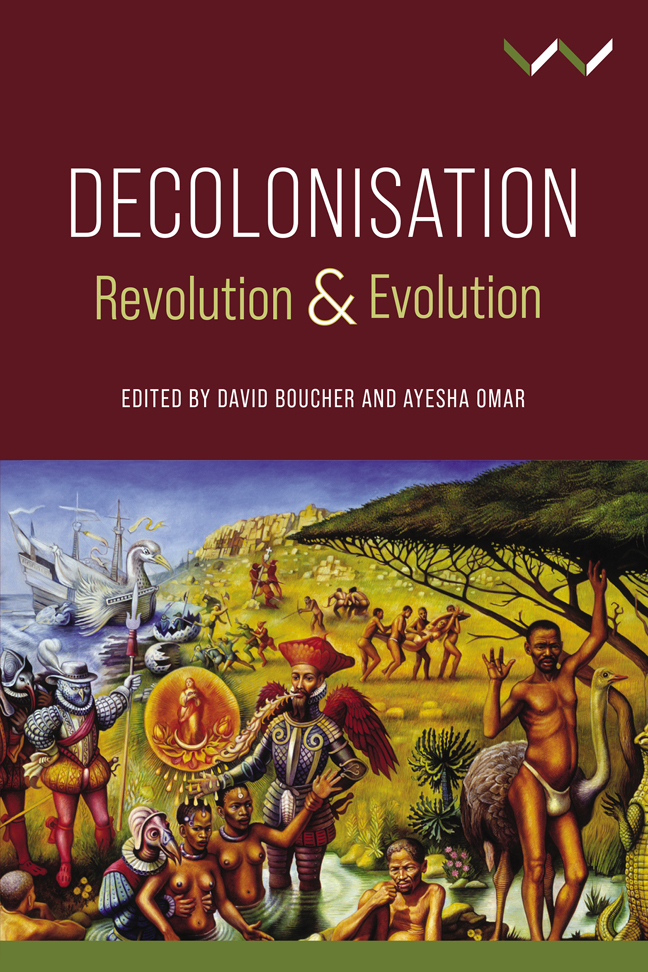Book contents
- Frontmatter
- Contents
- Acronyms
- Introduction: Decolonisation: Interdisciplinary Perspectives
- Chapter 1 The Invention of Blacks: Notes on Conquest, Fear and Time
- Chapter 2 The Decolonisation of Southern Africa: Historical Reflections
- Chapter 3 The Border of Trust at Kat River for Coloured Settlers, 1851–1853
- Chapter 4 Decolonisation and the Enduring Legacy of Colonial Borders in Africa
- Chapter 5 Fanon's Challenge: Identity, Recognition and Ideology
- Chapter 6 Beyond Redemption: Unsettling Progressive-Romantic Storyings of Colonial Injustice in Western Critical Thought
- Chapter 7 The Limits of Decolonisation and the Problem of Legitimacy
- Chapter 8 Decolonisation – Real and Imagined
- Chapter 9 Decolonisation and the Crisis of African Literature in the Twenty-First Century
- Chapter 10 Pedagogical Disobedience in an Era of Unfinished Decolonisation
- Contributors
- Index
Chapter 6 - Beyond Redemption: Unsettling Progressive-Romantic Storyings of Colonial Injustice in Western Critical Thought
Published online by Cambridge University Press: 01 March 2024
- Frontmatter
- Contents
- Acronyms
- Introduction: Decolonisation: Interdisciplinary Perspectives
- Chapter 1 The Invention of Blacks: Notes on Conquest, Fear and Time
- Chapter 2 The Decolonisation of Southern Africa: Historical Reflections
- Chapter 3 The Border of Trust at Kat River for Coloured Settlers, 1851–1853
- Chapter 4 Decolonisation and the Enduring Legacy of Colonial Borders in Africa
- Chapter 5 Fanon's Challenge: Identity, Recognition and Ideology
- Chapter 6 Beyond Redemption: Unsettling Progressive-Romantic Storyings of Colonial Injustice in Western Critical Thought
- Chapter 7 The Limits of Decolonisation and the Problem of Legitimacy
- Chapter 8 Decolonisation – Real and Imagined
- Chapter 9 Decolonisation and the Crisis of African Literature in the Twenty-First Century
- Chapter 10 Pedagogical Disobedience in an Era of Unfinished Decolonisation
- Contributors
- Index
Summary
In the opening pages of Black Skin, White Masks, Frantz Fanon issues a call to his readers to consider every human problem from the standpoint of time. The present, Fanon contends, must be understood as contributing to the building of the future, and the future, in turn, as an edifice supported by the living. In locating the ‘structure’ of the future in an imagining of the present as ‘something to be exceeded’, Fanon (2008, 6) expresses a familiar idea, present also in Karl Marx's characterisation of critique as ‘the self-clarification of the struggles and wishes of the age’ (see Fraser 2020, 25). This idea, as glossed by Boaventura de Sousa Santos, is that ‘there is no way of knowing the world better than by anticipating a better world’, and that when critical work is detached from hope for transcendence of the present it risks becoming meaningless (Santos 2016, viii). When interventions fail to help us imagine, glimpse, or reach for something better, they appear as something other than critical – conservative or irrelevant, for instance – still with the power to disturb perhaps, but not in a way that promises to take us anywhere. They lack criticality, we might say, by virtue of their apparent disassociation from progressive hope.
In one way or another, this idea permeates all that we would today label as critical. It is so ingrained, in fact, as to usually be taken for granted. Nevertheless, it has been brought into sharper focus by work exposing the role that progressive imaginaries have played in the history of Western colonialism and imperialism (Mignolo 2011; Mignolo and Walsh 2018; Ndlovu-Gatsheni 2013; Quijano 2000). Charting how narratives of modernity, enlightenment, forwardness/backwardness, divine providence, salvation and development have been central to the enactment and rationalisation of colonial injustice, scholars in this vein establish direct connections between Western ideas of progress and the suffering of colonised and racialised populations. While exceeding the critical branches of Western thought in any specific way, these charges nevertheless weigh especially heavily here. They reveal how Western critical work has, in seeking to set itself up in opposition to injustice, more often implicitly supposed – or explicitly defended – notions of Western superiority than served to disrupt them. Moreover, it has done so even while opposing the micro and macro politics of colonialism.
- Type
- Chapter
- Information
- DecolonisationRevolution and Evolution, pp. 143 - 164Publisher: Wits University PressPrint publication year: 2023



